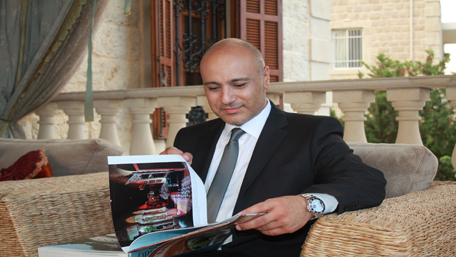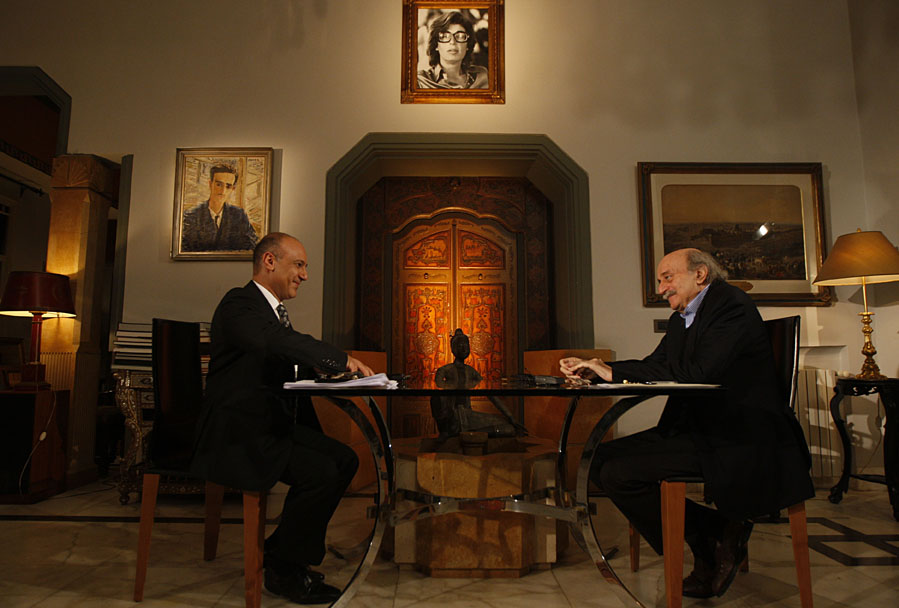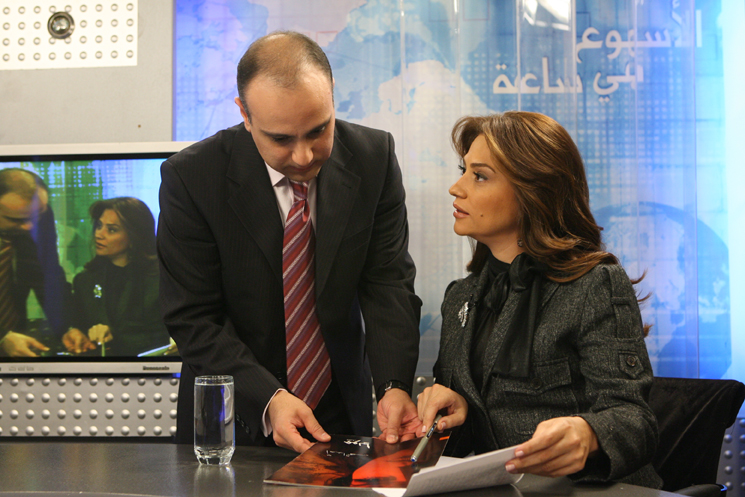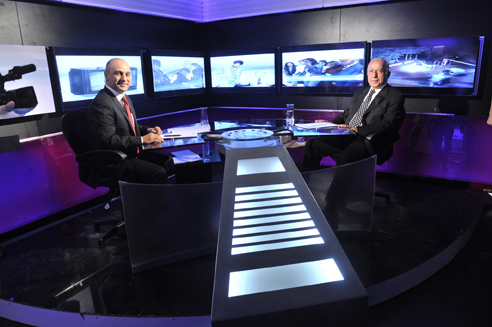Ambitious and passionate about his work
© Archives Georges Salibi / Photo: Jean Keyrouz
Firm and courteous, George Salibi does not hesitate to ask relevant questions to his guests.
In Lebanon, talk show hosts can be counted on the fingers of one hand. This business is it so difficult to exercise? It seems so, as these experts of knowing how to talk and the culture of dialogue enjoy alongside the talent, essential qualities, such as general knowledge, thorough preparation and direct and decent language. If in thirteen years George Salibi was able to give the best of himself to viewers in his weekly talk show Al Osboue fi Saa, it is thanks to these assets. Moreover, in a cordial and rewarding visit to Prestige, he unveils his new hidden talents of director and producer.
How did you come to the media world? It is a love story that began at the age of three years. A passion that I had to discover a post, the radio, the sound box that drew me irresistibly to stammer the name of the host Nahida Fadl el Dajjani broadcasting a show that my mother always liked to listen to, and to the news of radio Lebanon, the official and only station at the time.This passion for radio and writing dwelt me for the rest of my schooling. At the university stage, my parents dreamed of seeing me doctor or an engineer, and I dreamed of media and information. After two years of management to keep them happy, I headed to the information. In the first year of faculty, I had chosen as practical work, to interview Maguy Farah, the star of the Voice of Lebanon at the time. What was my happiness when she pointed out to me that I had a beautiful voice. Proud of this testimony, I was determined to integrate the Voice of Lebanon at the end of my studies. In 1990, I entered the radio to present the news and socio-cultural programs. Then it was Télé Liban.
For how long have you been on TV? My debut on television, Télé Liban, was made at the initiative of my friend the director Wissam Chahine, who was looking for new faces and new presenters. I managed to lead a highly cultural evening with Salwa Katrib and Romeo Lahoud among other stars. For two years, from 1999 to 2001, I hosted the morning program including headlines, apolitical meeting, a dialogue with a guest live…In September 2001,with the reopening of the Al Jadeed TV, I was asked to present the TV news and animate the Sunday political talk show Al Osboue fi Saa(one week in one hour), which diffusion continues for thirteen years.
© Archives Georges Salibi
Georges Salibi Interviewing the leader Walid Jumblatt at his home in Clemenceau.In 2003, you said to Prestige: “I dream of making a historical documentary. The talk show lasts the time of the show, the documentary remains. “In 2013, you realized your dream with the Enlightenment years Lebanon 1950-1975. Tell us… I am happy to have realized that dream. I had also mentioned for the first time at Prestige, which has brought me luck. I admit having always had this passion for documentaries. Thinking about my Lebanon nicknamed the Switzerland of the East, and the golden age of Beirut, I wanted to explore this beautiful nostalgic era that I did not know personally. Thus was born the documentary evoking the Beautiful Lebanon, “The Enlightenment years Lebanon1950-1975.” Jean Keyrouz directed the film and he even composed a few scores.
What was new in this documentary? The documentary that required nine months of serious and continuous preparation, focuses on culture and tourism that were flourishing at that time. I was the narrator and I discussed several topics in a poetic way: Beirut and its main streets, theater, cinema, festivals, notably that of Baalbeck, the press, the TV in Lebanon, etc. I chose eighteen iconic Lebanese personalities, impressive and famous symbols of that era, which have included some valuable testimonies, each in their respective field, simultaneously with the screening of unique photos of the place. I quote May Arida, Nidal al Achkar, Abdel Halim Caracalla, Mounir Bou Debs, Romeo Lahoud, Wadih el Safi, Ounsi el Hage, Adel Malek, Gaby Lteif, Mona Ross…
Where have you screened the documentary? At the Institut du Monde Arabe in Paris in 2013, then in NewYork and Washington. It was also screened in Brussels under the patronage of the Lebanese Ambassador in Belgium. The reaction of the public in these countries was amazing, especially during the interventions of the illustrious May Arida telling the inauguration of Baalbeck Festival by President Camille Chamoun, or that of the legendary Nidal al Achkar recounting her troubles with the authorities during the closing of her theater. Circumstances prevented me to project in Lebanon, but I hope to do in the fall, with a tour of the universities so that young people see the beauty of this time.
© Archives Georges Salibi
Georges Salibi in Baalbeck, with ministers Raymond Arayji and Michel Pharaon, and star Assi el Hellani who presented his show despite all the incidents that threatened the Bekaa.
Do you intend to start a production company? Since 2005, under strong pressure from my job, research, archives, editing, friends advised me to create a production company. This is how I plan to launch the Metro GS Productions.
What are your future plans? The documentary about the heyday was the starting point, my first experience. Currently a very interesting project is being prepared, another dream to realize. I would like to make a documentary on old houses in Beirut, an immortal land heritage endangered. I will draw my information from many sources: the Ministry of Culture, APSAD with testimonials from famous personalities.
© Archives Georges Salibi
Georges Salibi with singer Julia Boutros.You lead the talk show of Sunday Al Osboue fi Saa. What difficulties do you encounter in dialogue with some of the guests? After thirteen years of broadcasting, I went beyond difficulties. The challenge that remains ahead is to keep the level of excellence already attained, evolve, build self-criticism to move forward, to create new things and improve myself by improving my show. I cannot afford to be flowing and accommodating in my profession.
Why don’t you invite women to your show? First, let me say that the rate of women in politics as well as those who wish to appear on the small screen is minimal. Still, for my part, I consider myself lucky to have hosted three first ladies on my show. In her first appearance on TV, Wafaa Sleiman was my guest, Mouna Haraoui and Nayla Moawad too. Similarly, journalists May Chidiac and Scarlett Haddad, Minister Mona Afeiche, MP NaylaTueni, Princess Hayat Arslan…
You have evolved from soft talk to a fighting spirit. Which character gave you a hard time? There is no particular character. It is rather a set of violent reactions from the part of some guests who spoil the supposedly healthy atmosphere. The rate of abuse among the guests peaked. Or the guests who are challenging each other and do not hesitate to leave the studio if they are unhappy. The atmosphere is flawed and disappointing.
And the most charismatic character? Again, there is not a character but several who have charisma. As an example, I quote the leader Walid Jumblatt who is always awaited and monitored, Speaker Nabih Berri, Sayyed Hassan Nasrallah, General Michel Aoun, Dr.Samir Geagea, Sleiman Frangieh.
You welcomed the Minister Sleiman Frangieh and the show had success… It was unprecedented. Far from being a ritual talk-show, I showed the other non-political face of the guest. The program required a month of preparation. We flew over the region on a plane piloted by the Minister in person, we also met his family at home. We also discovered the cleared agricultural surfaces and splendor of the natural reserve. So many new developments that have brought a touch of beauty and originality to the show.
How do you reconcile objectivity and subjectivity? Once the music and the credits started before the start of the show, it is the profile of the objective and committed host that is emerging. But when it comes to unfortunate events that revolt me as a citizen, or a threat to public order, I become subjective, because my word is supposed to express the pain of the people.
© Archives Georges Salibi
And with Tahseen Khayat, CEO of NTV, Al JadeedWhere do you get your information sources? I take them through the daily and continuous tracking of events in newspapers and press releases. It’s also a team that prepares a summary of the facts. Also from my own research, private sources of my journalist friends or randomly.
The October issue of the monthly Prestige is dedicated entirely to men. What would you say to male youth? What picture do you have of the woman? And what message would you address to her? Without pretending to give them a sermon, I would ask male youth to focus more on human relationships. Technology has invaded the new generation that no longer communicates verbally but through social networks. Speaking directly with someone is essential to distinguish the tone, emphasis. We are seeing a total lack of dialogue and communication. The attractive woman must have a sacred mixture: reason, mind, spirit and seductive charm that we never find in a “beautiful” woman. Lebanese is a modern woman in excellence, this pulsed Western modernity, which has unfortunately removed the simplicity necessary and essential, replacing it by primp and dressing up in mannerism.
How long do we call this world: “A man’s world?”I would translate”man”by humans. There are women who have a desire, toughness, planning and determination that are lacking in many men. Similarly to man. The important is reason.
Your main character trait? Stubborn, patient, tenacious and persistent. Calm, the calm that can turn into a storm.
The favorite quality in a man, a woman? Morality, character, nobility and greatness of soul of man; vital tenderness of the woman, even if she is the president of the Republic.
What do you like in your friends? Those who keep the secret, the men of dialogue and friendly people.
Your main fault? Meticulous, perfectionist and maniac.
Your hobbies? Sports, swimming, cinema, theater, music, historical novels and books of Ounsi el Hage .My great passion? The songs of the diva Feyrouz.
If you were not on TV, who would you be? Your hero in life? Writer playwright or director of film and theater. There is no specific hero, but rather a set of qualities and human values.
You are for the woman who says yes or say no? It is not good that women always say yes. Sometimes you appreciate the one that says no, but not always.
What do you hope in this despair of regional stability? No one can predict the future. But it seems that the regional and international situation is conducive to maintaining stability in Lebanon.
Are you dreaming of a new style talk show in Lebanon? The dream is still allowed, but its implementation remains difficult.
Interview by MIREILLE BRIDI BOUABJIAN










